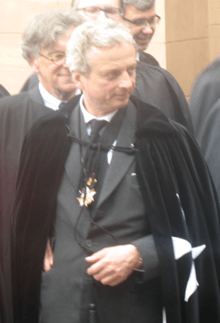Prince Oscar of Prussia (born 1959)
Prince Oscar of Prussia (German: Oskar Prinz von Preussen; born 6 May 1959) is a member of the House of Hohenzollern, the former ruling house of Prussia, and a pretender in line to the German throne. He is the thirty-seventh Herrenmeister ("Master of the Knights" or Grand Master) of the Order of Saint John (Bailiwick of Brandenburg).
| Prince Oscar | |
|---|---|
 Prince Oscar of Prussia in vestments as Grand Master of the Order of Saint John (Bailiwick of Brandenburg) | |
| Born | 6 May 1959 |
| Spouse | Auguste Zimmermann von Siefart |
| Issue | Prine Oskar Princess Wilhemine Prince Albert |
| House | Hohenzollern |
| Father | Prince Wilhelm-Karl of Prussia |
| Mother | Armgard von Veltheim |
| Occupation | media businessman |
Life
He is the second son of Prince Wilhelm-Karl of Prussia and wife Armgard von Veltheim, and the great-grandson of Wilhelm II, the last German Emperor and King of Prussia. He married Auguste Zimmermann von Siefart (born 1962) and they had three children: Prince Oskar (born 1993), Princess Wilhelmine (born 1995) and Prince Albert (born 1998).
Prince Oscar graduated as Ph.D. at the Free University of Berlin in 1995 and made a career as a media manager, amongst other as head of the German branch of Discovery Channel, founder of KiKa, new media manager of Hubert Burda Media Group and radio manager of Holtzbrinck Publishing Group.
Since 1999 he serves as the Herrenmeister (Grand Master) of the Order of Saint John (Bailiwick of Brandenburg), following his father Prince Wilhelm-Karl of Prussia and his grandfather Prince Oskar of Prussia, and he is a distant cousin of each of the respective sovereign heads of the Orders of St John of the British and Commonwealth realms (Prince Richard, Duke of Gloucester), of the Netherlands (until his death in 2004 Prince Bernhard of the Netherlands, since vacant) and of the Order of St John in Sweden (King Carl XVI Gustav), which constitute the Alliance of the Orders of Saint John of Jerusalem.
Distinctions
- Herrenmeister (Grand Master) of the Order of Saint John (Bailiwick of Brandenburg)
Works
- Wilhelm II. und die Vereinigten Staaten von Amerika: zur Geschichte seiner ambivalenten Beziehung. Dissertation. Freie Universität Berlin 1995. Ars Una, Neuried 1997, ISBN 3-89391-058-1.
See also
Further reading
- Heinrich Freiherr von Massenbach: Die Hohenzollern einst und jetzt. 17. Auflage. Bonn 2004.
- Wolfgang Stribrny: Der Johanniter-Orden und das Haus Hohenzollern. Niederweisel 2004 (= Schriftenreihe des Hess. Genossenschaft des Johanniterordens, Heft 24).